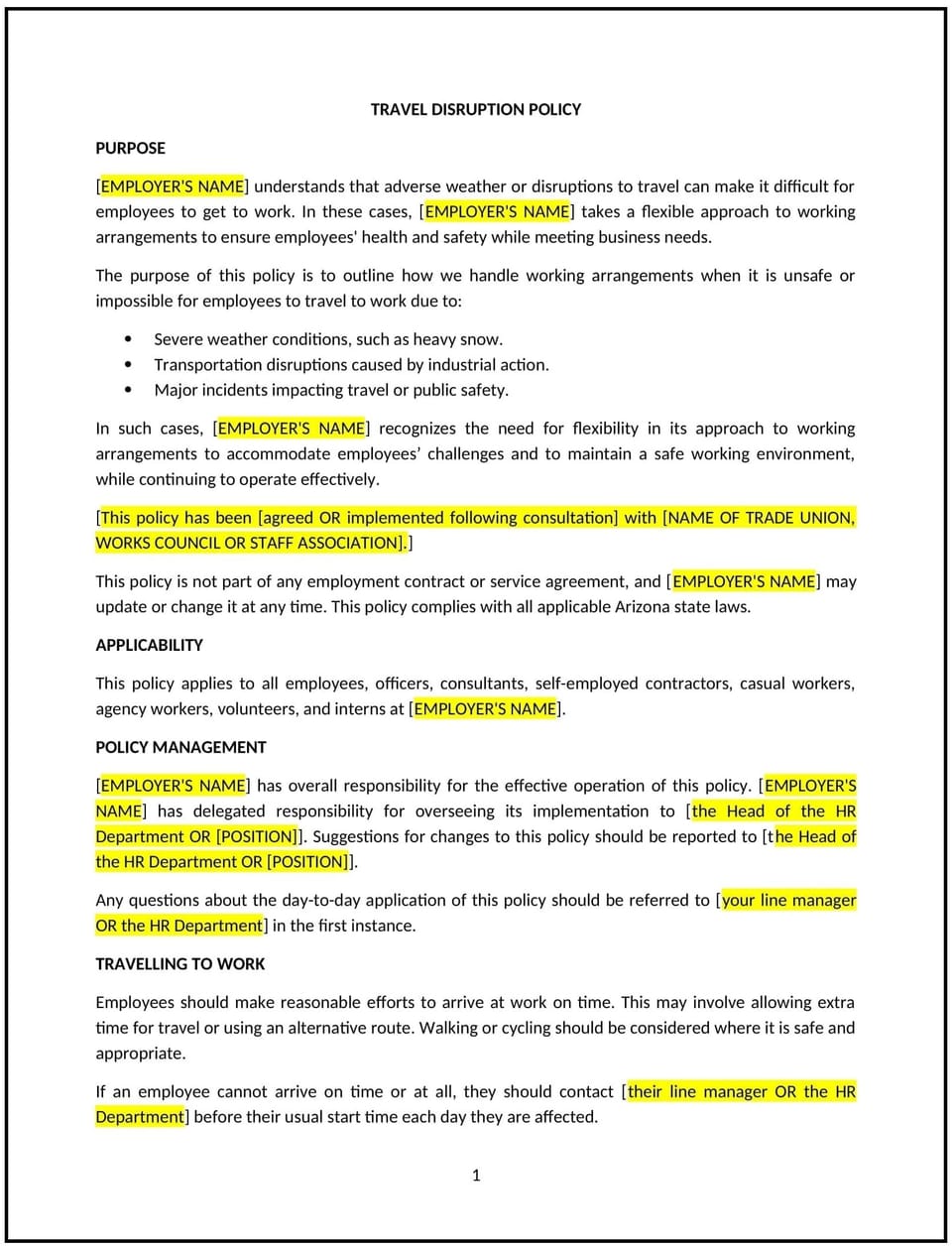Travel disruption policy (Arizona): Free template

Travel disruption policy (Arizona)
In Arizona, a travel disruption policy provides employees with guidelines for managing situations where business travel is interrupted due to unforeseen circumstances, such as weather events, cancellations, or other external factors. This policy helps the business minimize disruptions to operations while ensuring that employees are supported and expenses are managed appropriately.
This policy outlines the steps for employees to take in the event of travel disruptions, reimbursement procedures, and the company’s responsibilities in mitigating the impact on business operations. By implementing this policy, Arizona businesses can ensure continuity, manage costs, and maintain employee satisfaction during travel disruptions.
How to use this travel disruption policy (Arizona)
- Define eligible disruptions: Specify the types of disruptions covered by the policy, such as flight cancellations, weather-related delays, transportation issues, or natural disasters.
- Set communication procedures: Outline the steps employees should take when they experience a travel disruption, including notifying their manager, HR, or the travel coordinator immediately.
- Address accommodation arrangements: Clarify how the business will assist employees with booking alternative travel, accommodations, or meals during disruptions.
- Reimbursement procedures: Provide clear guidelines for reimbursing employees for any reasonable expenses incurred due to the disruption, such as meal costs, additional transportation, or extended accommodations.
- Document disruptions: Require employees to keep receipts and provide documentation of any additional costs related to the disruption for reimbursement processing.
Benefits of using a travel disruption policy (Arizona)
This policy offers several advantages for Arizona businesses:
- Ensures continuity: Minimizes the impact of travel disruptions on business operations by providing clear steps for employees to follow.
- Manages costs: Helps the business control additional expenses related to travel disruptions by setting guidelines for what is reimbursed and ensuring only reasonable costs are covered.
- Increases employee satisfaction: Demonstrates the business's commitment to supporting employees during stressful situations, which can enhance morale and retention.
- Reduces confusion: Provides clear guidance for employees on how to handle disruptions and what to expect, reducing uncertainty and frustration.
- Supports operational efficiency: By having a policy in place, the business can streamline the process of managing disruptions, ensuring that all employees are treated consistently.
Tips for using this travel disruption policy (Arizona)
- Address Arizona-specific considerations: Ensure the policy takes into account any local factors, such as frequent weather-related disruptions, that could impact travel plans.
- Use technology: Leverage travel management software or tools to monitor travel schedules and assist with rebooking or managing disruptions.
- Train employees: Provide training on the policy to ensure employees understand how to respond to disruptions and what they are entitled to during these events.
- Regularly update: Review and update the policy as needed to reflect changes in the travel industry, business operations, or regulations that may affect travel disruptions.
- Document thoroughly: Require employees to submit detailed records and receipts to ensure proper reimbursement and transparency.
Q: How does this policy help the business manage travel disruptions?
A: This policy provides clear guidelines on how employees should handle travel disruptions, ensuring that the business can respond quickly and efficiently, minimizing disruptions to operations.
Q: What steps should the business take when an employee experiences a travel disruption?
A: The business should ensure that employees are notified of the process for handling disruptions, including rebooking travel, arranging accommodations, and managing any additional expenses, in line with the policy.
Q: How does the business control costs associated with travel disruptions?
A: The business can control costs by setting guidelines on what constitutes reimbursable expenses, ensuring that only reasonable costs, such as meals, additional transportation, and accommodations, are covered.
Q: What should the business do if multiple employees are affected by a travel disruption at the same time?
A: The business should prioritize communication, ensure that alternative arrangements are made promptly, and maintain coverage for critical roles by reallocating responsibilities or rescheduling meetings as necessary.
Q: How does this policy ensure fairness and consistency for all employees during disruptions?
A: The business ensures fairness by applying the same rules and procedures to all employees, providing clear documentation requirements, and offering timely support for all disruptions in accordance with the policy.
This article contains general legal information and does not contain legal advice. Cobrief is not a law firm or a substitute for an attorney or law firm. The law is complex and changes often. For legal advice, please ask a lawyer.


